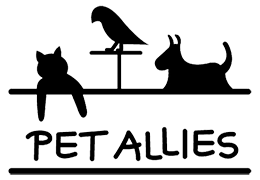Whistleblower Policy
Whistleblower Policy
In keeping with the policy of maintaining the highest standards of conduct and ethics, PET ALLIES will investigate any suspected fraudulent or dishonest use or misuse of PET ALLIES’ resources or property by staff, board members, consultants, or volunteers while protecting the interested parties who make such reports from retaliation.
Questionable Conduct
Staff, board members, consultants, and volunteers (hereafter referred to as interested parties) are encouraged to report suspected fraudulent or dishonest conduct (i.e., to act as “whistleblower”), pursuant to the procedures set forth below.
This policy is designed to address situations in which an interested party suspects another interested party has engaged in illegal acts or questionable conduct involving PET ALLIES’ assets. This conduct might include outright theft (of equipment or cash), fraudulent expense reports, misstatements of any accounts to any manager or to PET ALLIES’ auditors, or even an interested parties’ conflict of interest that results in financial harm to PET ALLIES. PET ALLIES encourages interested parties to do so anonymously.
Making a Report
If an interested party suspects illegal conduct or conduct involving misuse of PET ALLIES’ assets or in violation of the law, he or she may report it, anonymously if the interested party wishes, and will be protected against any form of harassment, intimidation, discrimination, or retaliation for making such a report in good faith.
Interested parties can make a report to any of the following PET ALLIES’ executives at any time: President, Treasurer, or Committee Chair. PET ALLIES’ will promptly conduct an investigation into matters reported, keeping the informant’s identity as confidential as possible consistent with our obligation to conduct a full and fair investigation.
Alternatively, interested parties can make a report by calling either the board chair or a committee chair.
No Retaliation
An interested party who has made a report of suspicious conduct and who subsequently believes he or she has been subjected to retaliation of any kind by any PET ALLIES’ interested party is directed to immediately report it to the President, the Treasurer, or a committee chair as appropriate.
Reports of retaliation will be investigated promptly in a manner intended to protect confidentiality as much as practicable, consistent with a full and fair investigation. The party conducting the investigation will notify the interested party of the results of the investigation.
PET ALLIES strongly disapproves of and will not tolerate any form of retaliation against interested parties who report concerns in good faith regarding PET ALLIES’ operations. Any interested parties who engage in such retaliation will be subject to discipline up to and including termination.
PET ALLIES’ Reporting Procedures
The “whistleblower” procedure is intended to describe the process through which concerns about the possible misuse of PET ALLIES’ assets are handled pursuant to PET ALLIES’ whistleblower policy.
1. An interested party makes a report of suspected misuse of PET ALLIES’ assets by reporting in person to a PET ALLIES’ executive, or reporting anonymously to the board chair or a committee chair.
2. The report is promptly reviewed by the President, as well as the Treasurer, to determine whether the report constitutes a complaint or a non-complaint, unless one of them is allegedly involved in the misconduct, in which case the report should be reviewed by only one of them. (If both of them are alleged to be involved, the report should go directly to the Vice President or a committee chair.)
o A complaint means any report involving (i) questionable accounting, auditing, financial reporting, or internal controls; (ii) suspected fraud, theft, or improper use of company assets; (iii) a violation of PET ALLIES’ conflict-of-interest policy that results in a financial harm to PET ALLIES; or (iv) a claim of retaliation against any interested parties making a good-faith report regarding any of the preceding matters.
o A non-Complaint means a report of any other matter not involving a misuse of PET ALLIES’ assets
1. If the report is deemed to be a complaint, it will be promptly investigated and forwarded to the President. If the report is deemed to be a non-complaint, it will be referred to the appropriate executive or manager for follow-up. Some non-complaints may involve serious matters and may require prompt investigation, but may nevertheless not involve misuse of PET ALLIES’ assets.
2. Each complaint is fully investigated, and as far as possible handled so as to protect the privacy of the interested parties making the complaint. A written report of the outcome of each investigation is prepared and delivered to a committee chair.
3. The President decides whether the report involves a matter that is material. If it is deemed material, it is reviewed by the executive committee, which may take actions to resolve the situation. If the report is deemed nonmaterial, it is not reviewed by the committee but is instead addressed by the President, as appropriate.
Rights and Responsibilities
Supervisors
Supervisors are required to report suspected fraudulent or dishonest conduct to the President. Reasonable care should be taken in dealing with suspected misconduct to avoid
• Baseless allegations
• Premature notice to persons suspected of misconduct and/or disclosure of suspected misconduct to others not involved with the investigation
• Violations of a person’s rights under law
Due to the important yet sensitive nature of the suspected violations, effective professional follow-up is critical. Supervisors, while appropriately concerned about “getting to the bottom” of such issues, should not in any circumstances perform any investigative or other follow-up steps on their own. Accordingly, a supervisor who becomes aware of suspected misconduct:
• Should not contact the person suspected to further investigate the matter or demand restitution;
• Should not discuss the case with attorneys, the media, or anyone other than the chief executive;
• Should not report the case to an authorized law enforcement officer without first discussing the case with the President.
Investigation
All relevant matters, including suspected but unproved matters, will be reviewed and analyzed, with documentation of the receipt, retention, investigation, and treatment of the complaint. Appropriate corrective action will be taken, if necessary, and findings will be communicated to the reporting person and his or her supervisor. Investigations may warrant investigation by independent persons such as auditors and/or attorneys.
Whistleblower Protection
PET ALLIES will protect whistleblowers as defined below:
• PET ALLIES will use its best efforts to protect whistleblowers against retaliation. Whistleblowing complaints will be handled with sensitivity, discretion, and confidentiality to the extent allowed by the circumstances and the law. Generally, this means that whistleblower complaints will only be shared with those who have a need to know so that PET ALLIES can conduct an effective investigation, determine what action to take based on the results of any such investigation, and in appropriate cases, with law enforcement personnel. (Should disciplinary or legal action be taken against a person or persons as a result of a whistleblower complaint, such persons may also have the right to know the identity of the whistleblower.)
• Interested parties of PET ALLIES may not retaliate against a whistleblower for informing management about an activity which that person believes to be fraudulent or dishonest with the intent or effect of adversely affecting the terms or conditions of the whistleblower’s connection to PET ALLIES, including but not limited to, threats of physical harm, loss of job, punitive work assignments, or impact on salary or fees. Whistleblowers who believe that they have been retaliated against may file a written complaint with the President. Any complaint of retaliation will be promptly investigated and appropriate corrective measures taken if allegations of retaliation are substantiated. This protection from retaliation is not intended to prohibit supervisors from taking action, including disciplinary action, in the usual scope of their duties and based on valid performance-related factors.
• Whistleblowers must be cautious to avoid baseless allegations (as described in the definitions section of this policy).
Definitions:
Baseless Allegations
Allegations made with reckless disregard for their truth or falsity. Individuals making such allegations may be subject to disciplinary action by PET ALLIES, and/or legal claims by individuals accused of such conduct.
Fraudulent or Dishonest Conduct
A deliberate act or failure to act with the intention of obtaining an unauthorized benefit. Examples of such conduct include
• Forgery or alteration of documents
• Unauthorized alteration or manipulation of computer files
• Fraudulent financial reporting
• Pursuit of a benefit or advantage in violation of PET ALLIES’ Conflict-of-Interest Policy
• Misappropriation or misuse of PET ALLIES’ resources, such as funds, supplies, or other assets
• Authorizing or receiving compensation for goods not received or services not performed
• Authorizing or receiving compensation for hours not worked
Whistleblower
An interested party who informs a supervisor or the President about an activity relating to PET ALLIES which that person believes to be fraudulent or dishonest.

